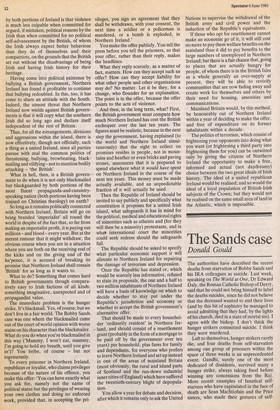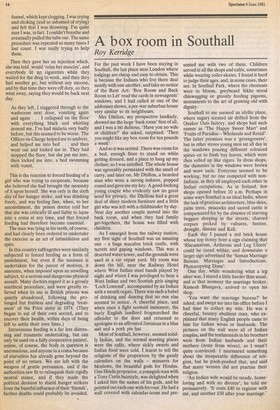The Sands case
Donald Gould
The authorities have described the recent deaths from starvation of Bobby Sands and his IRA colleagues as suicide. Last week, speaking on The World at One, Dr Edward Daly, the Roman Catholic Bishop of Derry, said that he could not bring himself to label the deaths suicides, since he did not believe that the deceased wanted to end their lives (and by this bit of sophistry he managed to avoid admitting that they had, by the lights of his church, died in a state of mortal sin). I agree with the bishop. I don't think the hunger strikers committed suicide. I think they were murdered.
Left to themselves, hunger strikers rarely die, and four deaths from self-starvation among one group of prisoners within the space of three weeks is an unprecedented event. Gandhi, surely one of the most dedicated of dissidents, survived many a hunger strike, always taking food before winning any concessions from the Raj. More recent examples of fanatical selfstarvers who have capitulated in the face of death are Sean MacStiofain and the Price sisters, who made their gestures of self sacrifice under the same banner as that of the new martyrs.
So what has happened? Why have earlier attempts at suicide by starvation usually failed, and why have we now had four deaths in a row? The likely explanation is that resolution falters as starvation begins to affect the metabolism of the brain, and the physical instinct and appetite for survival becomes stronger than the purely intellectual desire to protest. At this stage the starving person is likely to be highly suggestible. A doctor or friend can readily reinforce the instinct for survival by persuading the physically and emotionally shaky starver to accept, say, milk instead of water. And the fast is broken, and not resumed. The persuasion is made easier by the fact that, whereas a starving person soon loses the desire for solid food, thirst remains painful to the end.
But, equally well, the heightened suggestibility, and the failing self-control, make it a simple matter for outsiders to sustain the weakening internal drive to act the martyr. And that, clearly, is what has been happening in Ireland, whether the support for the will to die has been in the form of words spoken and messages conveyed, or whether it has been derived solely from the victim's knowledge that he is under orders which he dare not disobey. To this extent the IRA is directly responsible for the recent deaths, which, but for the pressures applied, would almost certainly not have happened. (Witness the prompt manner in which Brendan McLaughlin abandoned his fast and accepted treatment for his life-threatening ulcer last week the moment he was granted 'permission' so to do.) Is there any way in which further deaths can be avoided? The reintroduction of forced feeding is not the answer. It is a horrifying procedure which, in the past, has ended more lives than it has saved, occasionally because the tube forced down the throat pierces the gullet, but more often because it induces vomiting, and some of the vomitus is inhaled, and the weakened victim quickly succumbs to pneumonia. Moreover, whilst the authorities who employ the manoeuvre always claim that they are solely concerned for the welfare of the subject, it can be, and often has been, used as a form of torture, and to teach awkward customers a sharp lesson.
This, for example, is how Judy Todd described to me her experience of the matter as it happened some nine years ago in Smith's Rhodesia: I voas in the bed. A male medical orderly (who was youngish, and had quite a nice face) applied the mouth gag, and implicitly followed their directions. Then this sister started shoving the tube down my throat. It hurt quite a lot, and I started choking. I thought they would just put it down my throat, but it went on and on and I suppose they eventually got it into my stomach. Then the doctor poured the food mixture in through the funnel, which kept clogging. I was crying and choking (and so ashamed of crying) and felt that I was drowning. I'm quite sure I was, in fact. I couldn't breathe and eventually pulled the tube out. The same procedure was repeated so many times I lost count. I was really trying to help them.
Then they gave her an injection which, she was told, would 'relax her muscles', and everybody lit up cigarettes while they waited for the drug to work, and then they had another go, but without any success, and by that time they were off duty, so they went away, saying they would be back next day.
As they left, I staggered through to the washroom next door, vomiting again and again . . . I collapsed on the floor with everything black and whirling around me. I've had malaria very badly before, but this seemed to be worse. The Officer-in-Charge helped me to undress, and helped me into bed . . . and then went out and locked me in. They had mopped the floor, but she put me into, then locked me into, a bed swimming with vomit.
This is the reaction to forced feeding of a girl who was trying to cooperate, because she believed she had brought the necessity of it upon herself. She was only in the sixth day of her hunger strike, and was drinking freely, and was feeling fine, when, to her astonishment, the prison doctor told her that she was critically ill and liable to lapse into a coma at any time, and that forced feeding had therefore become essential.
The man was lying in his teeth, of course, and had clearly been ordered to undertake the exercise as an act of intimidation and spite.
In this country suffragettes were similarly subjected to forced feeding as a form of punishment, but even if the measure is undertaken for the purest of motives, it amounts, when imposed upon an unwilling subject, to a serious and dangerous physical assault. Many doctors regard it as a grossly unethical procedure, and were greatly relieved when its use in British prisons was quietly abandoned, following the prolonged but fruitless and degrading 'treatment' of the Price sister in 1974. (They began to eat of their own accord, and to recover their health, within days of being left to settle their own fates.) Intravenous feeding is a far less distressing and traumatic undertaking, but can only be used on a fully cooperative patient, unless, of course, the body in question is unconscious, and anyone in a coma because of starvation has already gone beyond the point of no return. We are left with the weapon of gentle persuasion, and if the authorities saw fit to relinquish their rigidly neutral stance, and if they made the political decision to shield hunger strikers from the baneful influence of their 'friends', further deaths could probably be avoided.












































 Previous page
Previous page